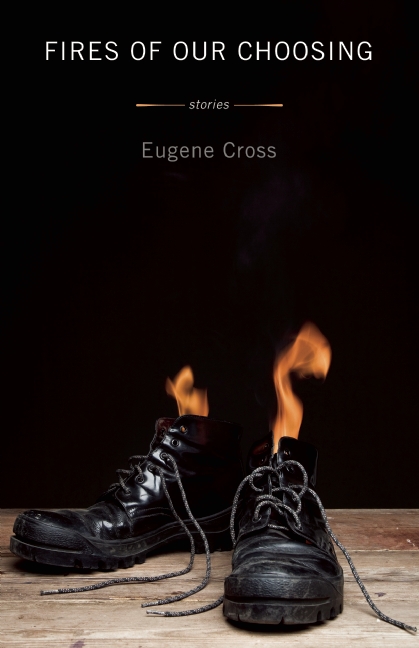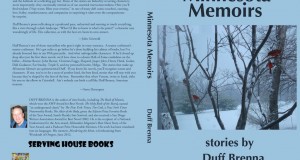
“Fires of Our Choosing” is written in such a deceptively simple style that you’re surprised when each story hits with such impact.
There’s something deceptively simple about this book and Eugene Cross’s writing style. When you first read the collection, the stories appear un-intrusive, deadpan, easy picking. But there is something complex that surprises you every time.
(By the way, Eugene Cross offered to send me a free copy of the book, but because I’m a believer in supporting indie authors, I actually purchased the book on Kindle.)
If you’re a writer, like myself, at first you fool yourself into thinking, “I could do this. I could write this story,” only to be hit in the chest with a depth of emotions you didn’t realize was actually there at first.
The two major themes that this collection tackles are ideas of loneliness and abandonment. Almost every main character in each story has either been abandoned or has lost something, whether it’s a house that burned down or a mother who abandons her son to go apologize (alone) to the boy he beat up half-to-death in school. Or the woman who has to clean up after her brother committed suicide. Or the harvester who travels the country to earn a living but always tries to return to the same woman.
The writing itself is sharp, deliberate and at times cunning.
“I knew also what it was like to wake up in a hospital room, one arm connected to an IV, the other handcuffed to the bedrail, your best friend dead in a car you were driving. I knew what it was like to have a policeman look at you like you were the lowest thing on earth and tell you the wreck was so twisted that emergency crews had to cut the legs off the corpse to remove it.”
Other times you’re forced to re-read the same story two or three times before you’re sure you caught all the subtleties.
I was first introduced to Cross in a fiction writing class at Pitt and I didn’t even know it. It wasn’t until I hit about halfway through his collection that I realized I had read one of his stories before.
The story was “Hunters” — which is now a personal favorite.
“Hunters” is about a narrator who revisits the memory of the time he committed adultery with a woman he met at a bar. But the driving force behind this piece is not the drunken, sexual tension, but rather the confession-style approach the narrator takes as soon as he discovers whom the woman left behind at her house. The discovery is almost haunting. There’s a complex sadness and selfishness that takes over, and Eugene never once tells you how you must feel about the situation. You just feel it.
As the narrator begins to tell his story he says, “But on this night, the one I’m going to tell you about…”
And as the reader, you wonder, who’s the “You” in this story?
And I realized that answering that question would unlock the answer to the rest of the stories: the entire collection. When the narrator in “Hunters” says “you,” he says it directly to the reader. After all, it is the reader who is the listener to all of these tales of sorrow, loneliness and abandonment. Why? Because we, as the readers, are meant to feel remorse, compassion and maybe even hope for these characters. The stories intend to connect and communicate with the reader directly. It is by joining these two identities (characters and reader) together that these stories are truly resolved. The one thing that these abandoned people need most is for someone to listen to them.
The same is true for the stories that end without a real ending: Without a conclusion.
One story ends like this:
“He heard footsteps come thumping across the floorboards, and he waited, not knowing in the slightest what might happen next.”
That’s it. Nothing after that.
In the other story, a man hands his wife a rifle and then:
“When he reached the truck, he climbed into the cab, shut the door, and watched her, waiting to see what she would do.”
Why would an author do this to his readers? Why would he torture them with an “unfinished” work? The reason is (and the answer lies) in the details of the story brought forth, up until that crucial moment.
So often Cross makes you feel like a Literary Sherlock Holmes, one who tries to find answers in the clues of the story’s details. Every gesture means something greater. Every memory and moment holds momentum to propel you forward to a conclusion.
So even when two of the stories are complete cliff hangers, you (as the reader) are meant to feel alright, because the answers have been given to you all along. Whether the message is about a man finally taking chances without known results or a man (who loves routines) embracing the unpredictable, these stories end right where they should.
There was only one story where I felt the ending was unwarranted by the “clues” leading up to it, in “The Brother.” That was the only time I wish that more had been revealed between the two main characters to justify the twist at the end of the story.
Otherwise, the collection overall is believable and enjoyable.
I’ve often reflected about short stories and whether they are still pertinent today. Eugene Cross proves that they are. Short Stories are relevant to our culture not because they’re big money makers (quite the contrary in fact) but because it forces readers to think more clearly. Something our society deeply needs.
Cross’ stories not only make you think, but they make you feel human and extend compassion to a lonely bunch, reminding you that even when you feel lonely, by sharing your own story with others you can feel more connected.
A solid 5 stars for this collection. Nicely done.
Visit Eugene Cross’s website here, and please support him by buying a copy of this fine collection.
 Michel Sauret – Award-Winning Army Journalist | Independent Author Award-Winning Army Journalist, Independent Author
Michel Sauret – Award-Winning Army Journalist | Independent Author Award-Winning Army Journalist, Independent Author







One comment
Pingback: June Giveaway: Autographed copy of “Fires of Our Choosing” | Michel Sauret – Award-Winning Army Journalist | Independent Author